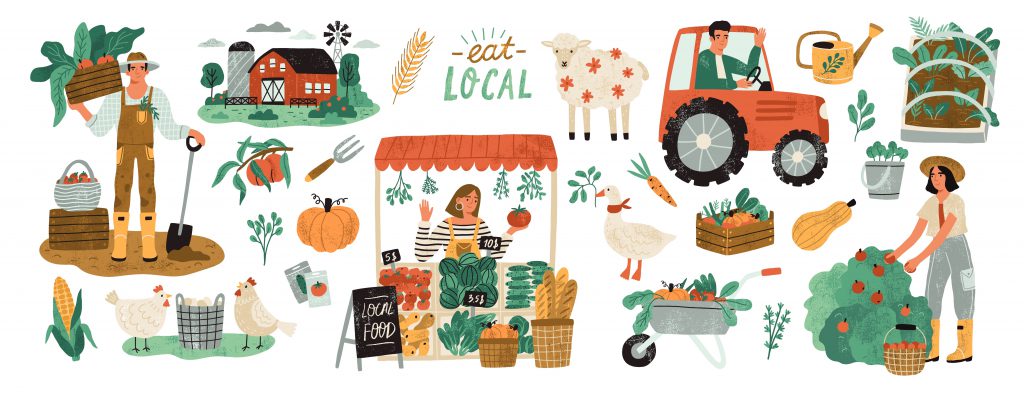Over the last decades new organization of food production and distribution, as part of small-scale and local agriculture, have been gaining ground. Generically termed short supply chains (SSCs) or Alternative Food Network (AFN), these new models comprises various forms such as Community-Supported Agriculture, box schemes and Solidarity Purchase Groups. In AFNs (1) the relationship between consumers and producers is not only mediated by intermediaries; (2) the product has symbolic values for consumers due to its origin and to the type of transaction; and (3) the short distance between producers and consumers implies personal and strong relationships. Consumers are principally encouraged by the desire to preserve local producers, as well as the social and environmental aspects of farming; the utility for producers derives not only from the monetary return but, again, from the mode of sharing. The interest in AFNs is growing even more in the scientific debate, because practice of food provisioning participating in Alternative Food Networks have been defined as examples of circular food initiatives.
ENDLESS group is active on studies focused on the organizational structure of AFNs; in the analysis of the benefits derived from the creation of relationship between consumers and producers; on researches focused on the mechanism of consumers’ participation in the process of food provisioning in AFNs, and in the analysis on how AFNs success is linked to the ability to spread within the economic system and become a circular economy model highlighting good practices.
- Pascucci S., Lombardi A., Cembalo L., Dentoni D. (2013). Governance mechanisms in Food Community Networks, Italian Journal of Food Science, 25(1), 98-104.
- Migliore G., Caracciolo F., Lombardi A., Schifani G., Cembalo L. (2014). Farmers’ Participation in Civic Agriculture: The Effect of Social Embeddedness, Culture, Agriculture, Food and Environment, 36(2), 105-117. DOI: 10.1111/cuag.12038
- Cembalo L., Lombardi A., Pascucci S., Dentoni D., Migliore G., Verneau F., Schifani G. (2015). “Rationally local”: Consumer participation in alternative food chains, Agribusiness, 31(3), 330-352. DOI: 10.1002/agr.21419
- Lombardi A., Migliore G., Verneau F., Schifani G., Cembalo L. (2015). Are “good guys” more likely to participate in local agriculture? Food Quality and Preference, 45(10), 158-165. DOI: 10.1016/j.foodqual.2015.06.005
- Pascucci, S., Dentoni, D., Lombardi, A., Cembalo, L. (2016). Sharing values or sharing costs? Understanding consumer participation in alternative food networks. NJAS-Wageningen Journal of Life Sciences, 78, 47-60. DOI: 10.1016/j.njas.2016.03.006

In a global context where the objective is the achievement of sustainability, there is increasing interest toward innovative food and feed such as insects as an alternative protein source in Western countries. Insects provide a valuable source of high-quality proteins, minerals, vitamins and carbohydrates and may represent a potential solution to deficiencies in minerals. Moreover, insects provide food at low environmental cost and contribute positively to livelihoods, compared to conventional livestock system of production. Due to benefits from a sustainable point of view, the production and consumption of insects based products have been defined in recent literature as examples of circular food initiatives.
ENDLESS group has developed a research agenda with the objective to analyse consumers’ acceptability and willingness to buy insects based products throughout a mixed within/between experimental design. Moreover, ENDLESS group is constantly dedicated in the identification and monitoring of innovative food and feed products and services.
- Lombardi, A., Vecchio, R., Borrello, M., Caracciolo, F., & Cembalo, L. (2019). Willingness to pay for insect-based food: The role of information and carrier. Food Quality and Preference, 72, 177-187. DOI: 10.1016/j.foodqual.2018.10.001
- STAR PROJECT – Line 1- Junior principal investigator Grants (Winner and P.I) 2015-2017: Consumers acceptability of insects in human diets – funded by COINOR.



